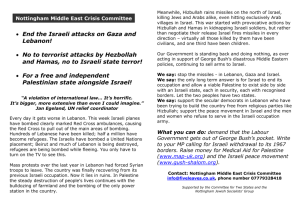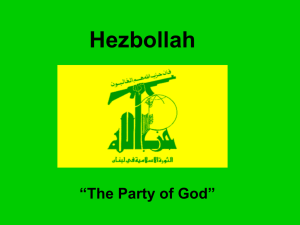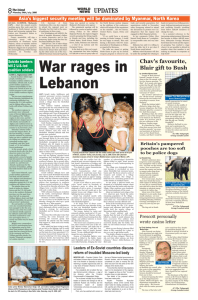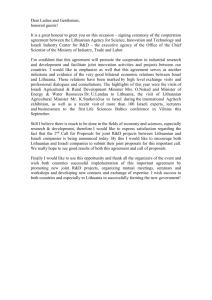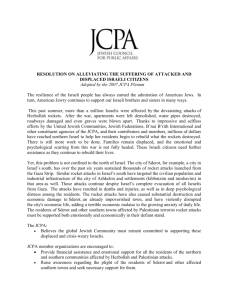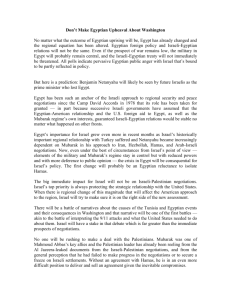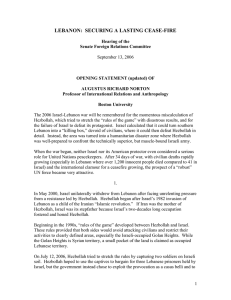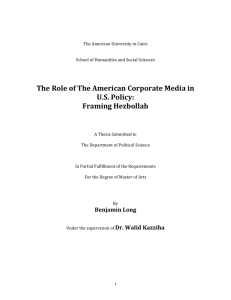Hezbollah Insists on Owning Weapons for Self-Defense
advertisement
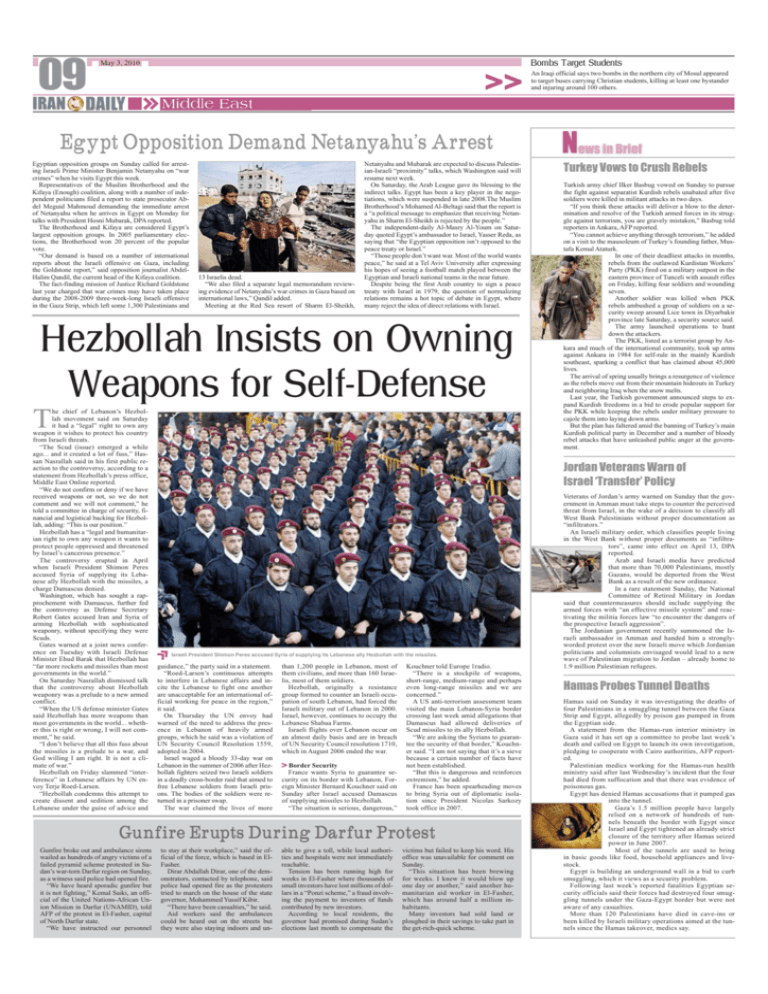
09 Bombs Target Students May 3, 2010 An Iraqi official says two bombs in the northern city of Mosul appeared to target buses carrying Christian students, killing at least one bystander and injuring around 100 others. Middle East Egypt Opposition Demand Netanyahu’s Arrest Egyptian opposition groups on Sunday called for arresting Israeli Prime Minister Benjamin Netanyahu on “war crimes” when he visits Egypt this week. Representatives of the Muslim Brotherhood and the Kifaya (Enough) coalition, along with a number of independent politicians filed a report to state prosecutor Abdel Meguid Mahmoud demanding the immediate arrest of Netanyahu when he arrives in Egypt on Monday for talks with President Hosni Mubarak, DPA reported. The Brotherhood and Kifaya are considered Egypt’s largest opposition groups. In 2005 parliamentary elections, the Brotherhood won 20 percent of the popular vote. “Our demand is based on a number of international reports about the Israeli offensive on Gaza, including the Goldstone report,” said opposition journalist AbdelHalim Qandil, the current head of the Kifaya coalition. The fact-finding mission of Justice Richard Goldstone last year charged that war crimes may have taken place during the 2008-2009 three-week-long Israeli offensive in the Gaza Strip, which left some 1,300 Palestinians and 13 Israelis dead. “We also filed a separate legal memorandum reviewing evidence of Netanyahu’s war crimes in Gaza based on international laws,” Qandil added. Meeting at the Red Sea resort of Sharm El-Sheikh, Netanyahu and Mubarak are expected to discuss Palestinian-Israeli “proximity” talks, which Washington said will resume next week. On Saturday, the Arab League gave its blessing to the indirect talks. Egypt has been a key player in the negotiations, which were suspended in late 2008.The Muslim Brotherhood’s Mohamed Al-Beltagi said that the report is a “a political message to emphasize that receiving Netanyahu in Sharm El-Sheikh is rejected by the people.” The independent-daily Al-Masry Al-Youm on Saturday quoted Egypt’s ambassador to Israel, Yasser Reda, as saying that “the Egyptian opposition isn’t opposed to the peace treaty or Israel.” “Those people don’t want war. Most of the world wants peace,” he said at a Tel Aviv University after expressing his hopes of seeing a football match played between the Egyptian and Israeli national teams in the near future. Despite being the first Arab country to sign a peace treaty with Israel in 1979, the question of normalizing relations remains a hot topic of debate in Egypt, where many reject the idea of direct relations with Israel. Hezbollah Insists on Owning Weapons for Self-Defense T he chief of Lebanon’s Hezbollah movement said on Saturday it had a “legal” right to own any weapon it wishes to protect his country from Israeli threats. “The Scud (issue) emerged a while ago... and it created a lot of fuss,” Hassan Nasrallah said in his first public reaction to the controversy, according to a statement from Hezbollah’s press office, Middle East Online reported. “We do not confirm or deny if we have received weapons or not, so we do not comment and we will not comment,” he told a committee in charge of security, financial and logistical backing for Hezbollah, adding: “This is our position.” Hezbollah has a “legal and humanitarian right to own any weapon it wants to protect people oppressed and threatened by Israel’s cancerous presence.” The controversy erupted in April when Israeli President Shimon Peres accused Syria of supplying its Lebanese ally Hezbollah with the missiles, a charge Damascus denied. Washington, which has sought a rapprochement with Damascus, further fed the controversy as Defense Secretary Robert Gates accused Iran and Syria of arming Hezbollah with sophisticated weaponry, without specifying they were Scuds. Gates warned at a joint news conference on Tuesday with Israeli Defense Minister Ehud Barak that Hezbollah has “far more rockets and missiles than most governments in the world.” On Saturday Nasrallah dismissed talk that the controversy about Hezbollah weaponry was a prelude to a new armed conflict. “When the US defense minister Gates said Hezbollah has more weapons than most governments in the world... whether this is right or wrong, I will not comment,” he said. “I don’t believe that all this fuss about the missiles is a prelude to a war, and God willing I am right. It is not a climate of war.” Hezbollah on Friday slammed “interference” in Lebanese affairs by UN envoy Terje Roed-Larsen. “Hezbollah condemns this attempt to create dissent and sedition among the Lebanese under the guise of advice and Turkey Vows to Crush Rebels Turkish army chief Ilker Basbug vowed on Sunday to pursue the fight against separatist Kurdish rebels unabated after five soldiers were killed in militant attacks in two days. “If you think these attacks will deliver a blow to the determination and resolve of the Turkish armed forces in its struggle against terrorism, you are gravely mistaken,” Basbug told reporters in Ankara, AFP reported. “You cannot achieve anything through terrorism,” he added on a visit to the mausoleum of Turkey’s founding father, Mustafa Kemal Ataturk. In one of their deadliest attacks in months, rebels from the outlawed Kurdistan Workers’ Party (PKK) fired on a military outpost in the eastern province of Tunceli with assault rifles on Friday, killing four soldiers and wounding seven. Another soldier was killed when PKK rebels ambushed a group of soldiers on a security sweep around Lice town in Diyarbakir province late Saturday, a security source said. The army launched operations to hunt down the attackers. The PKK, listed as a terrorist group by Ankara and much of the international community, took up arms against Ankara in 1984 for self-rule in the mainly Kurdish southeast, sparking a conflict that has claimed about 45,000 lives. The arrival of spring usually brings a resurgence of violence as the rebels move out from their mountain hideouts in Turkey and neighboring Iraq when the snow melts. Last year, the Turkish government announced steps to expand Kurdish freedoms in a bid to erode popular support for the PKK while keeping the rebels under military pressure to cajole them into laying down arms. But the plan has faltered amid the banning of Turkey’s main Kurdish political party in December and a number of bloody rebel attacks that have unleashed public anger at the government. Jordan Veterans Warn of Israel ‘Transfer’ Policy Israeli President Shimon Peres accused Syria of supplying its Lebanese ally Hezbollah with the missiles. guidance,” the party said in a statement. “Roed-Larsen’s continuous attempts to interfere in Lebanese affairs and incite the Lebanese to fight one another are unacceptable for an international official working for peace in the region,” it said. On Thursday the UN envoy had warned of the need to address the presence in Lebanon of heavily armed groups, which he said was a violation of UN Security Council Resolution 1559, adopted in 2004. Israel waged a bloody 33-day war on Lebanon in the summer of 2006 after Hezbollah fighters seized two Israeli soldiers in a deadly cross-border raid that aimed to free Lebanese soldiers from Israeli prisons. The bodies of the soldiers were returned in a prisoner swap. The war claimed the lives of more than 1,200 people in Lebanon, most of them civilians, and more than 160 Israelis, most of them soldiers. Hezbollah, originally a resistance group formed to counter an Israeli occupation of south Lebanon, had forced the Israeli military out of Lebanon in 2000. Israel, however, continues to occupy the Lebanese Shabaa Farms. Israeli flights over Lebanon occur on an almost daily basis and are in breach of UN Security Council resolution 1710, which in August 2006 ended the war. Border Security France wants Syria to guarantee security on its border with Lebanon, Foreign Minister Bernard Kouchner said on Sunday after Israel accused Damascus of supplying missiles to Hezbollah. “The situation is serious, dangerous,” Kouchner told Europe 1radio. “There is a stockpile of weapons, short-range, medium-range and perhaps even long-range missiles and we are concerned.” A US anti-terrorism assessment team visited the main Lebanon-Syria border crossing last week amid allegations that Damascus had allowed deliveries of Scud missiles to its ally Hezbollah. “We are asking the Syrians to guarantee the security of that border,” Kouchner said. “I am not saying that it’s a sieve because a certain number of facts have not been established. “But this is dangerous and reinforces extremism,” he added. France has been spearheading moves to bring Syria out of diplomatic isolation since President Nicolas Sarkozy took office in 2007. Gunfire Erupts During Darfur Protest Gunfire broke out and ambulance sirens wailed as hundreds of angry victims of a failed pyramid scheme protested in Sudan’s war-torn Darfur region on Sunday, as a witness said police had opened fire. “We have heard sporadic gunfire but it is not fighting,” Kemal Saiki, an official of the United Nations-African Union Mission in Darfur (UNAMID), told AFP of the protest in El-Fasher, capital of North Darfur state. “We have instructed our personnel News in Brief to stay at their workplace,” said the official of the force, which is based in ElFasher. Dirar Abdallah Dirar, one of the demonstrators, contacted by telephone, said police had opened fire as the protesters tried to march on the house of the state governor, Mohammed Yussif Kibir. “There have been casualties,” he said. Aid workers said the ambulances could be heard out on the streets but they were also staying indoors and un- able to give a toll, while local authorities and hospitals were not immediately reachable. Tension has been running high for weeks in El-Fasher where thousands of small investors have lost millions of dollars in a “Ponzi scheme,” a fraud involving the payment to investors of funds contributed by new investors. According to local residents, the governor had promised during Sudan’s elections last month to compensate the victims but failed to keep his word. His office was unavailable for comment on Sunday. “This situation has been brewing for weeks. I knew it would blow up one day or another,” said another humanitarian aid worker in El-Fasher, which has around half a million inhabitants. Many investors had sold land or ploughed in their savings to take part in the get-rich-quick scheme. Veterans of Jordan’s army warned on Sunday that the government in Amman must take steps to counter the perceived threat from Israel, in the wake of a decision to classify all West Bank Palestinians without proper documentation as “infiltrators.” An Israeli military order, which classifies people living in the West Bank without proper documents as “infiltrators”, came into effect on April 13, DPA reported. Arab and Israeli media have predicted that more than 70,000 Palestinians, mostly Gazans, would be deported from the West Bank as a result of the new ordinance. In a rare statement Sunday, the National Committee of Retired Military in Jordan said that countermeasures should include supplying the armed forces with “an effective missile system” and reactivating the militia forces law “to encounter the dangers of the prospective Israeli aggression”. The Jordanian government recently summoned the Israeli ambassador in Amman and handed him a stronglyworded protest over the new Israeli move which Jordanian politicians and columnists envisaged would lead to a new wave of Palestinian migration to Jordan – already home to 1.9 million Palestinian refugees. Hamas Probes Tunnel Deaths Hamas said on Sunday it was investigating the deaths of four Palestinians in a smuggling tunnel between the Gaza Strip and Egypt, allegedly by poison gas pumped in from the Egyptian side. A statement from the Hamas-run interior ministry in Gaza said it has set up a committee to probe last week’s death and called on Egypt to launch its own investigation, pledging to cooperate with Cairo authorities, AFP reported. Palestinian medics working for the Hamas-run health ministry said after last Wednesday’s incident that the four had died from suffocation and that there was evidence of poisonous gas. Egypt has denied Hamas accusations that it pumped gas into the tunnel. Gaza’s 1.5 million people have largely relied on a network of hundreds of tunnels beneath the border with Egypt since Israel and Egypt tightened an already strict closure of the territory after Hamas seized power in June 2007. Most of the tunnels are used to bring in basic goods like food, household appliances and livestock. Egypt is building an underground wall in a bid to curb smuggling, which it views as a security problem. Following last week’s reported fatalities Egyptian security officials said their forces had destroyed four smuggling tunnels under the Gaza-Egypt border but were not aware of any casualties. More than 120 Palestinians have died in cave-ins or been killed by Israeli military operations aimed at the tunnels since the Hamas takeover, medics say.
